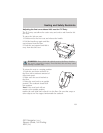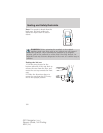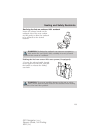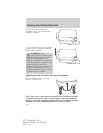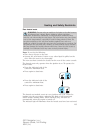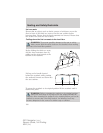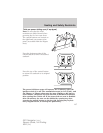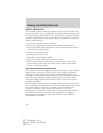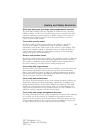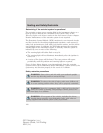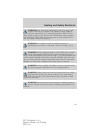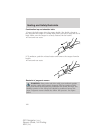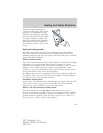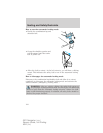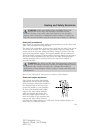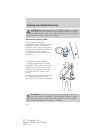
Driver and passenger dual-stage airbag supplemental restraints
The dual-stage airbags offer the capability to tailor the level of airbag
inflation energy. A lower, less forceful energy level is provided for more
common, moderate-severity impacts. A higher energy level is used for
the most severe impacts. Refer to Airbag supplemental restraints
(SRS) section in this chapter.
Front crash severity sensor
The front crash severity sensor enhances the ability to detect the
severity of an impact. Positioned up front, it provides valuable
information early in the crash event on the severity of the impact. This
allows your restraint system to distinguish between different levels of
crash severity and modify the deployment strategy of the dual-stage
airbags and safety belt pretensioners.
Driver’s seat position sensor
The driver’s seat position sensor allows your restraint system to tailor the
deployment level of the driver dual-stage airbag based on seat position.
The system is designed to help protect smaller drivers sitting close to
the driver airbag by providing a lower airbag output level.
Front safety belt usage sensors
The front safety belt usage sensors detect whether or not the driver and
front outboard passenger safety belts are fastened. This information
allows your restraint system to tailor the airbag deployment and safety
belt pretensioner activation depending upon safety belt usage. Refer to
Safety restraints section in this chapter.
Front safety belt pretensioners
The safety belt pretensioners at the front outboard seating positions are
designed to tighten the safety belts firmly against the occupant’s body
during frontal collisions, and in side collisions and rollovers. This helps
increase the effectiveness of the safety belts. In frontal collisions, the
safety belt pretensioners can be activated alone or, if the collision is of
sufficient severity, together with the front airbags.
Front safety belt energy management retractors
The front outboard safety belt energy management retractors allow webbing
to be pulled out of the retractor in a gradual and controlled manner in
response to the occupant’s forward momentum. This helps reduce the risk
of force-related injuries to the occupant’s chest by limiting the load on the
occupant. Refer to Safety restraints section in this chapter.
Seating and Safety Restraints
139
2011 Navigator (nav)
Owners Guide, 1st Printing
USA (fus)



